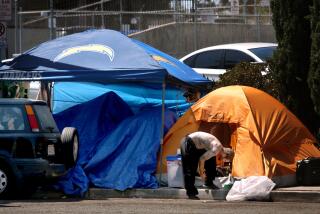Judges Look Into Law to Demand Court Space
A panel of San Diego Superior Court judges voted unanimously Monday to recommend that the court explore fully a little-known state law allowing judges to order county supervisors to provide adequate court facilities, Judge Michael I. Greer said.
The 22 judges, who belong to various court administration committees, voted to hire a lawyer to research the state law giving them authority to order creation of court facilities, according to Greer, the courtâs presiding judge.
Greer said a lawyer has not been selected to handle the job, but the attorney chosen will be expected to report back in January.
Based on that report, the idea will then be put to the entire Superior Court bench--or the 71 judges Greer expects to be on board by next month--for a vote. The court now has 69 judges, but Gov. George Deukmejian is expected to appoint two more by the end of the year.
San Diego judges have known about the law for some time, but Mondayâs meeting marked the first time the court has formally considered invoking it, Greer said.
The law allows judges to order a county board to provide âsuitable roomsâ and court equipment, Greer said. The cost of providing those facilities must be borne by the county General Fund, the law says.
Greer first announced the courtâs intent to consider the law last week. That announcement provoked opposition from county officials who maintained that the county has no extra money to finance courts and that any money that does go to the courts would be taken away from social services.
âIâve given some thought to that this weekend,â Greer said, âand maybe itâs too philosophical, but there is something more important than social service dollars, and that is freedom, the power of the courts.
âIf we are shut down by the inaction of the Board of Supervisors so that we canât function, it would cause a tear in the fabric of society,â Greer said. âThere is no protection by courts from the other two branches of government.
âI think (the law) is just a reflection of the Legislature, of that not happening,â he said. âWe, as the courts, owe responsibility for that not happening.
âThat may be a little too philosophical, but itâs something I think the public has to understand. Itâs what weâre fighting for.â
More to Read
Sign up for Essential California
The most important California stories and recommendations in your inbox every morning.
You may occasionally receive promotional content from the Los Angeles Times.



![[20060326 (LA/A20) -- STATING THE CASE: Marchers organized by unions, religious organizations and immigrants rights groups carry signs and chant in downtown L.A. "People are really upset that all the work they do, everything that they give to this nation, is ignored," said Angelica Salas of the Coalition of Humane Immigrant Rights. -- PHOTOGRAPHER: Photographs by Gina Ferazzi The Los Angeles Times] *** [Ferazzi, Gina -- - 109170.ME.0325.rights.12.GMF- Gina Ferazzi/Los Angeles Times - Thousands of protesters march to city hall in downtown Los Angeles Saturday, March 25, 2006. They are protesting against House-passed HR 4437, an anti-immigration bill that opponents say will criminalize millions of immigrant families and anyone who comes into contact with them.]](https://ca-times.brightspotcdn.com/dims4/default/34f403d/2147483647/strip/true/crop/1983x1322+109+0/resize/840x560!/quality/75/?url=https%3A%2F%2Fcalifornia-times-brightspot.s3.amazonaws.com%2Fzbk%2Fdamlat_images%2FLA%2FLA_PHOTO_ARCHIVE%2FSDOCS%2854%29%2Fkx3lslnc.JPG)






